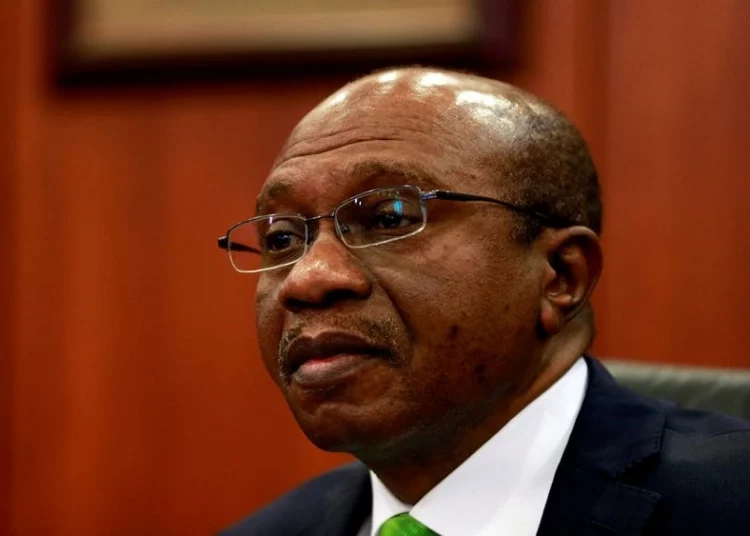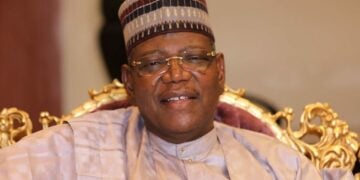The governor of the Central Bank of Nigeria (CBN) Godwin Emefiele has said the Monetary Policy Committee (MPC) will continue to raise benchmark interest rates as long as inflationary pressures continue even as the members further tightened rates by 100 basis to 14 per cent.
After hiking benchmark rate by 150 basis points at its meeting in May, the Monetary Policy Committee of the CBN once again raised benchmark rate by 100 basis points from 13 per cent to 14 per cent.
The decision was made as the members of the committee rose from its 286th meeting which was held in Lagos.
Emefiele speaking at the press briefing after the meeting said the decision was reached due to concerns of the members of the committee to curb the rising inflation which has soared to 18 per cent.
The committee had resolved to increase the MPR by 100 basis point from 13 per cent to 14 per cent. Retain the asymmetric corridor at +100 and -700 basis points around the MPR, retain CRR at 27.5 percent, and retain the liquidity ratio at 30 per cent.
Rising from the meeting yesterday, Emefiele said the decisions to raise the Monetary Policy Rate (MPR) had been unanimous as holding rates or loosening had not even been considered by the 11 members of the committee. One member had voted to raise rate by 150bps, another had proposed a 75bps hike while three and six members had voted for 50bps and 100bps increase in benchmark interest rate.
Stating that inflation can be a terrible scourge that is capable of totally obliterating the purchasing power of the weak and the vulnerable, Emefiele said the weakening purchasing power will also lead to heightened unemployment and will ultimately retard growth.
“We have to be very careful about the rate of acceleration of pricing or inflation it is a very serious matter that the policy committee because once you find that as inflation continues to trend higher it would no doubt adversely begin to retard growth. Many countries both developed and developing economies have had to embark on very aggressive rate increases so as to dampen the size of inflation.
In Nigeria, we have tried at a couple of meetings to leave rates the way they are and at the same time we are pushing on how to improve output. But of course with the aggressive acceleration of inflation rates in Nigeria, we decided in May after almost two and a half years to raise rates by 150bps.
Today, the last data put inflation at 18.6 per cent. MPC members feel we cannot just hold or continue to watch the inflation grow the way it is rising. Something must be done to rein in inflation. We conducted a very serious analysis of data that was presented to us at this meeting and we felt that there is a need, not just because we want to look at what other economies are doing, but we need to do a lot more work to rein in inflation. MPC did not even take any look at the issue of whether to hold rate constant or to loosen.
“Some analysts say we should not continue to increase rates because we have increased the cost of borrowing for the borrowers. It may also weaken manufacturing output. We agree with that postulation. The important thing is that as long as we see inflation at the level that can retard growth, it must be dealt with while at the same time we are looking at how to use development finance tools to do continue to push towards improved output growth.”
“That is what we’re doing. MPC is very determined that if inflation continues at this rate particularly aggressively, we will continue to tighten because that is the only thing that i can say at this time. As regards the decision whether to tighten or hold, the committee was unanimous and so did not consider both loosening and retaining rates at existing levels at this meeting.
“On loosening, the MPC felt it would worsen the existing liquidity conditions in the economy and further dampen the money market rate necessary to stimulate savings and investments. Members also felt that loosening would trigger the weakening of the exchange rate which could pass through to domestic prices. MPC did not also consider holding because it suggests that the bank is not responding to both global and domestic price development as inflation numbers continue to trend upwards
“On tightening, members were anonymous that given the aggressive increase in inflation, coupled with the resultant negative consequences particularly on the purchasing power of the poor as well as retarding growth, there is the need to continue to tighten. However, the policy dilemma was hinged around the level of tightening needed for inflation without dampening manufacturing output which could result on a higher cost of borrowing.
Reacting to the MPC stance on tightening, the Founder and Chief Executive of the Centre for the Promotion Of Private Enterprise (CPPE), Dr Muda Yusuf said, the tightening would only worsen the plight of those in production and many entrepreneurs in this economy. He noted that the hike will lead to is a hike lending rates.
He stated that many entrepreneurs and manufacturers are already indebted to the banks “and that means the banks will now be reviewing the terms of the credit. That is what happened the last time when MPR was hiked by 150 basis points. So it’s going to go higher now, and the thing is that is not likely to have any impact on inflation. MPR was increased two months ago. Between then and now, inflation even went higher. Because this economy is not a credit driven economy.
“Therefore, you cannot use monetary policy tools to correct an inflationary problem that is created by supply side issues. You wont get any concrete results, it will just make life more difficult for those who are investors in the economy who are already battling so many other problems. They are battling with problem of diesel costs, high electricity tarrif, exchange rates depreciation, high inflationary pressures and weakening purchasing power. So on top of that, you’re increasing the cost of their credit. So I don’t think this is good for the economy because the economy is not so much of the credit driven economy.
“Private sector credit to the economy as a percentage of GDP in Nigeria is less than 20 per cent. In South Africa it is over 100 per cent. In the United States, which we make reference to on policy tightening is over 200 per cent. That shows the amount of credit that is in the hands of the private sector compared to what we have in Nigeria. So it is not going to it’s not going to achieve much in my view. What we need to do is to focus on the supply side issues. Let’s see what you can do about these high cost of diesel. We need to use fiscal policy measures like import duty and tariffs to look at what we can do. We need to fix our refineries. Let us look at what we can do about foreign exchange, which unfortunately the CBN did not even address sufficiently.
“We have a gap of almost N200, 50 per cent premium between the official window and the parallel market window. MPC did not even make any reference to that. That’s a major crisis. We also need to address our problem of insecurity, which is fuelling food inflation because people cant go to farms. That we need to address the degree to which the CBN is funding the deficit of government. That is huge from the reports that we see and it’s highly inflationary as well.” He stated
On his part, Head, Financial Institutions Ratings at Agusto& Co, Ayokunle Olubunmi stated that the further hike is not likely to have any effect on taming inflationary pressures in the country. noting that the decision of the MPC to further tighten had caught everybody by surprise, he said “we were of the opinion that they would hold the rates at least for now, at least for this meeting and then we would probably see a hike from the next meeting but they caught everybody by surprise.”
With the CBN governor saying the tightening will continue as long as inflationary pressures remain, Olubunmi said: “the question then is to what extent will the CBN continue to hike rate. The challenge of the inflation that we have in Nigeria is not demand push but supply driven and it is mainly from the forex and other things.
“I don’t think this is going to tame inflation because despite increasing the MPR by 150bps at the last meeting, we still see that the rate on treasury bills is still very low. The rate on treasury bills is still being artificially managed, although banks have tried to increase their rates but the yield on the treasury bills is still low. In summary, I don’t think it is going to be significant in taming inflation.
“This is because what is driving inflation is not excess supply of cash, although probably what the CBN is trying to do is to see if the rate in the domestic market is high, it might discourage people from moving into dollar investment, keep more money in the economy and reduce pressure on the exchange rate and reserves.
“In terms of directly taming inflation, I doubt if it is going to work. The higher the rates, it would adversely impact GDP growth because it will be more expensive for people to borrow and if it is more expensive for people to borrow then it will adversely affect economic growth.
Also analysts at Cordros, in an emailed note, said: “before this meeting, we expected the Committee to keep the key policy rate unchanged to allow previous policy actions to fully permeate the economy while using the development finance initiatives to ease supply constraints. However, although the Committee agreed with our thought that the last hike had not permeated enough in the economy, we believe the decision to hike must have been induced by the sharper month-on-month inflation reading in June.
“The higher month-on-month increase points that further strengthening of monetary policy tightening is needed to effectively curtail the unabating inflationary pressures. Moreover, we think the MPC is trying to be proactive – moving ahead of the US fed which is expected to increase its key policy rate by 75bps at its next meeting on 27 July – to ensure that the impact on the domestic economy would be limited.
“Indeed, the Committee highlighted that the tightening was needed given the need to (1) signal a strong determination of the bank to aggressively address its price stability mandate and (2) narrow the real interest rate gap. Further out, the Committee highlighted that though output growth remains fragile, not containing the rising consumer prices now could derail the moderate gains achieved in improving consumer purchasing power, worsening poverty levels. Thus, the Committee advised the CBN to continue to use its development finance initiatives to ensure that output growth remain in focus.
“Overall, we think the pace of monetary policy tightening by systemic global central banks at their July policy meetings and what happens to global growth and inflation afterwards would provide the much-needed guidance as to how the MPC would react going further into the year. If global inflationary pressures persist and recession is avoided in key economies, we would expect global central banks to march on with the aggressive rate hikes to combat the unabating inflationary pressures.
“In that case, we envisage that the MPC would raise the MPR by 50bps at the September policy meeting to limit external pressures in the face of rising yields in advanced economies. However, if recession is not avoided in advanced economies, we expect the global central banks to slow down their interest rate hiking cycle. Thus, we would expect the MPC to hold off increasing the MPR until the November policy meeting as it tries to ease the burden on government borrowing costs.”





